- Home
- William Shatner
Spectre Page 2
Spectre Read online
Page 2
"Memlon," Kirk said. "Look around this field. Do you remember what it was like last year?"
Memlon held up his hand, fingers spread. "I'm six," he announced. As an afterthought, he held up one finger from his other hand as well.
Kirk took that to mean that Memlon had no memory of what this field used to look like. But Kirk did.
Three years ago, it had been like any other part of Chal's legendarily beautiful tropical islands: a slice of paradise, an Eden. Two years ago, the planet's plant life had been deliberately exposed to a virogen—a hideous disease organism which had reduced Chal's islands to an apocalyptic landscape of brown stubble and withered yellow vegetation. Not a flower had bloomed on the planet in more than a year.
But then, in that same year, Kirk had returned to this world eight decades after his "death" during the maiden voyage of the Enterprise-B. With Spock and McCoy, and with Captain Jean-Luc Picard and his new generation of Starfleet's finest, Kirk had discovered the conspiracy that had inflicted that hideous act of environmental terrorism on the worlds of the Federation. With the interplanetary civilizations of the Alpha and Beta Quadrants on the brink of environmental collapse, he and his allies had helped the Federation defeat the Vulcan Symmetrist movement. McCoy came up with an antivirogen, and the ecosystems of a hundred worlds were now being restored through their own natural healing processes.
Kirk had not saved the Federation, but he had bought it extra time to consider the fate that awaited it. In the next thirty years, he knew, and now others did too, that a new strategy of expansion and exploration must be embraced to allow humanity, and all the people of the galaxy, to live as part of the galactic ecology, not as its exploiters and spoilers. Otherwise, the next time environmental crisis struck, there would be no last-minute redemption.
But that was a challenge for Picard and his contemporaries. Kirk had fought his own war, too many times. So he had once again returned to Chal, and to his love, Teilani.
The spaceman had hung up his rockets. He was on this world to stay. To find a simpler life.
He had found it in this small patch of forest.
It was no more than a clearing in the midst of newly reborn vegetation, alive with birds and insects, ringed by vibrant green leaves, wreathed with flowers of uncountable colors. But it was Kirk's new home, new world, new universe.
A year ago, Teilani at his side, her hand in his, their hearts entwined, Kirk had stood in this clearing and, in an electrifying moment of self-realization, understood that he was Chal.
Born of conflict.
Subjected to incredible trials that had brought both to the edge of extinction.
And now, against all odds and expectations, reborn.
Kirk had never been one to waste the moments of his life, though he had too often been driven by his heart and by the moment, not by his intellect and reflection.
Here in this field, where his mind's eye in that instant had seen a simple wooden home, ringed by a veranda, powered by a simple windmill, and had seen the crops in the plots of soil to be carefully tended, Kirk resolved that his life would change.
Teilani had looked at him then, into his eyes, and so great was their love, so close their connection, that Kirk had not had to explain a word of what had arisen in his mind.
"You're right," Teilani had said with perfect understanding. "We'll build here. A house. A home."
And so in this field, Kirk had toiled.
Each tree he had cut down had been carefully stripped and planed to be used for that dwelling, so that nature's bounty wasn't squandered. Each tree had been replaced by a new seedling, precisely planted to provide shade for that dwelling and to maintain the balance of this world, so that nature was respected.
With a team of ordovers—the horned, horselike beasts of burden of Chal—pulling a hand-forged plow, Kirk had leveled the hillocks and filled in the depressions. He had carried the rocks that now strengthened the bank of the stream that flowed at the edge of the clearing. His skin had darkened beneath the suns of Chal, and since he no longer ate the precisely fortified and artificially enhanced foods of Starfleet, his hair had become threaded with silver. But each week, the rocks had become easier to lift, the ax easier to swing. New purpose had given him new strength and vitality.
The first time he had come to Chal, more than eighty years ago, he had believed his life to be at its end. The Enterprise-B was about to be launched. His career was over. The universe had seemed to have no more need for James T. Kirk. Had his life truly ended when history had first recorded it on that maiden flight of the new Enterprise, it would have been fitting. What additional contributions could be expected of him? How much more could the universe demand?
But as Spock was fond of reminding him, there were always possibilities. And Kirk felt certain that not even the Guardian of Forever could have predicted all the further adventures that had remained for him. Kirk himself still could not fully comprehend the gifts that life had bestowed upon him, and how his career had continued past any expectation or dream he had held at its beginning.
But, at last, even those adventures had come to an end, and it was to Chal he had come home.
Thus, where once he had roamed the galaxy, now he seldom strayed farther than the small cabin he shared with Teilani, and this field where he toiled. At this time in his life, after all he had accomplished, there was challenge here enough.
And the focus of that challenge was that one last miserable stump.
"Are you okay, mister?"
Kirk blinked at the little boy. "What?"
"Were you asleep?"
"I was thinking."
The child nodded sagely. "That's what my dad says when he lies on the hammock on the porch. He snores a lot when he thinks. Do you snore?"
Kirk was glad Teilani wasn't here to answer that question. "No," he said.
"We're you thinkin' about the stump?"
"I was."
"How come you don't blow it up?"
This time, Kirk thought about the problem at hand: how to explain to a child the reasoning of an adult. "Memlon, someday, when you're grown, you're going to pass by this field. And there will be a house built right where we're standing—"
"You're not standing, mister."
Kirk ignored him. "—where we are right now. And you'll see the crops, and the trees, and you'll be able to say to your children, Jim Kirk made that field the way it is. He planted every tree, took out every rock and stump, hammered every nail into every board of that house. That's Jim Kirk's field."
Kirk smiled as he contemplated that image. He wanted to build something with his own two hands. Create something that was uniquely his.
But Memlon frowned. "Who's Jim Kirk?"
Kirk sighed. He remembered speaking with computers that were as exasperating as this child. "I am."
The boy peered at him suspiciously. "Are you . . . Cap'n Kirk?"
Here we go, Kirk thought. Even after so many years, that old rank still followed him. Haunted him. The two great truths of the universe were that the future could never be foreseen, the past never escaped.
"Yes, I am," Kirk said.
Memlon didn't seem convinced. He leaned forward as if he might be able to see right through Kirk. "You don't look crazy."
Kirk tried to stand but his back screamed at him, making him grimace again. He coughed to cover the sudden expression of discomfort as he remained planted on the ground. "Who . . . says I'm crazy?"
Memlon shrugged. "Everybody."
"Why?"
The shrug became more exaggerated. "I dunno."
"Memlon . . ."
The sound of that new voice was like a wave of cool water to Kirk. He turned quickly, as if he were a teenager again, awaiting his first love at a secret rendezvous. "Teilani!"
And Teilani rode into the clearing, a vision, a dream come to life, her white wrap billowing from her as she sat bareback on Iowa Dream. The horse was a spectacular animal, a genetic re-creation of one of Earth's antique
breeds, known as a quarter horse. He had been a gift from Picard—a peace offering, Kirk suspected, considering the tension that had still remained between them after their last encounter.
Iowa Dream—the name chosen by Picard as well, in memory of an ancient champion and their own first meeting—stepped precisely from the trail to the center of the clearing, as magnificent as any other manifestation of nature on this planet.
Kirk didn't even bother to try to stand—he knew he couldn't make it—and he could see the look of amusement on Teilani's lovely face as she realized why he remained seated on the ground.
Memlon, on the other hand, shot off toward Teilani like a photon torpedo. "ghojmoHwl'! ghojmoHwl'!" he shouted. It was the Klingon word for "teacher," and Kirk realized that the child must be part of Teilani's weekly reading group.
Teilani expertly dismounted, her simple white leggings and tunic floating across her lithe body like wisps of clouds. Kirk had never seen anyone more beautiful, and in this setting, on this world, at this instant, his heart ached with his love for her,
Teilani walked over to Kirk, holding Memlon's hand, her bare feet sinking into the rich soil of Chal. She glanced at the stump. "The beast still mocks you?" she asked gravely.
"It started to move," Kirk said. Teilani gave him a knowing smile. "But your back moved more?"
Kirk's face admitted the truth.
Teilani untangled her hand from Memlon's, then held out both to Kirk. "Keep it straight," she said with the voice of experience. "Use your legs."
Keeping his back rigid, Kirk pulled himself up with Teilani as his brace. Then his lips were only centimeters from hers, and it was as if time had stopped in that moment, each detail of her appearance only serving to entrance him once again.
In human terms, Teilani might appear to be fifty, though like that of a Vulcan's, her unique genetic heritage thoroughly concealed the fact that she had lived for more than a century. Her hair, tied back for riding, was even more silvered than Kirk's, though to his eyes, it was as if she were wreathed in stars.
From the subtle ridges of her brow, past an eye and across one cheek, the angry slash of a virogen scar still flared. The same genetic engineering that had enhanced her health and longevity had also served to make her flesh resistant to protoplaser treatment. McCoy had proposed an experimental grafting procedure that might reduce the raised evidence of the scar tissue, making it possible to disguise the disfigurement with makeup. But Teilani had told him, No.
Whether it was the Klingon in her that made her choose to wear the blemish to her beauty with honor, or that she had come to understand that outward appearance meant nothing when measured against those qualities that dwelt within a warrior's heart, Kirk didn't know. And he didn't care. For when he looked at Teilani, he no longer saw the scar, nor the silvered hair, nor the lines that age brought even to those of Chal.
He saw only the woman he loved. And no sight could be more beautiful.
Kirk leaned forward to brush his lips against hers.
And instantly tensed as his back went into a spasm of pain.
Teilani was not sympathetic. "Five minutes at the clinic could take care of that for the next five years."
"I'll keep doing my exercises," Kirk told her. "No more protoplasers, no more forcefield readjustments."
Teilani tapped his forehead. "No more sense."
He took her hand. Kissed her finger. Was sorry Memlon was here. This clearing held many special memories for Kirk and his love.
The child tugged on Teilani's tunic.
"Yes?" Teilani said with the forbearance of a born teacher,
"ghojmoHwl', that's Cap'n Kirk!"
Teilani clapped her hands in surprise. "He is?"
Memlon nodded. "You be careful," he warned his teacher.
Teilani smiled at Kirk's look of consternation. "And why is that?" she asked with great seriousness.
"I'm crazy," Kirk explained.
He recognized the tremble that came to Teilani's lips when she tried not to laugh, and realized she had heard that conclusion before. "Who says?" she asked.
"Everyone," Kirk told her before Memlon could.
"I see. Well, if everyone says it, it must be true."
Memlon tugged on Teilani's tunic again.
"He doesn't got a phaser, neither."
"I know."
Mention's eyes widened in surprise. "You do?"
"And he doesn't got a replicator," Teilani said. "No tricorder. No communicator. No computer."
Memlon's mouth hung open. "Not even a padd?"
Teilani shook her head. "Not even a padd."
Memlon gazed at Kirk as if trying to make sense of a creature from another dimension. "How come?"
"Because we depend too much on machines," Kirk told the boy. "We've given up too much of our independence, too much of our connection to the worlds around us. We've cut ourselves off from the experiences that make us human, from the knowledge that we are part of nature,"
Memlon blinked, not a gram of comprehension in him.
"Do you understand a single word I've said?"
"Nope."
Teilani knelt down to hold the child's hands. "Memlon, it's getting close to supper time. I think you should be going home."
Memlon nodded. "All right, ghojmoHwl'." He drew his hands away, hesitated, then threw his arms around Teilani's neck and hugged her.
Teilani hugged him back, gave him a kiss on his ridges, and stood up laughing as Memlon ran off toward the path.
Then she slipped her arm around Kirk—very carefully.
"Do they really think I'm crazy?" Kirk asked.
"Who?" Teilani replied innocently.
Kirk frowned. "Everyone."
"They don't understand you."
"But you do?"
Teilani lightly traced her fingers down the opening of Kirk's tunic. "I love you, James. But I'll never understand you."
Kirk took her errant hand before it could distract him further. "Why do they feel that way?"
Teilani seemed surprised he could even ask that question. "Because of the way you deny your past."
"I don't deny it."
"But you do. Across the Federation, children learn your name in school. Starfleet cadets study your logs from the first year of the Academy to their graduate studies. They've written books about you, created data tapes, there's even that opera on Qo'Nos—"
Kirk held up his hands, cutting off the recitation. "Those aren't me. They're reflections, interpretations. They've . . . taken on a life of their own."
"I know that. But they're also an indication of the effect you've had on the lives of millions, billions of beings. You can't deny that. And it's wrong of you to try."
"I don't . . . deny what I've done."
Teilani became serious, and Kirk recognized he was not looking into the eyes of his lover, but of Chal's greatest diplomat, the woman who had successfully brought this troubled world into the Federation.
"You do deny it, James. Every day."
Kirk said nothing.
"You've fought gods. You've changed the course of history. You've walked more worlds than most people will ever even see in tapes. And after all that, you've spent the last year of your life doing battle with . . . with a tree stump. A tree stump you could deal with in a second with a phaser, or in a minute with the same team of ordovers you used to level the field."
Kirk held out his hands to her. "I want this to be our home. A home that I build for us."
Teilani sighed as if this discussion were one they had had every day. In a way, it was. "James, you are my home. Where you are, my heart follows."
"And my heart is here, on Chal."
But Teilani, eyes full of love, shook her head. "I know that's what you tell yourself. But that's not what you believe. Not really."
Kirk was silent, not wanting to argue. It was what he believed. It had to be.
He felt Teilani's hand caress his cheek.
"I don't know which is more stubborn
," she said. "You or that stump."
Kirk took her hand, looked at her again, afraid of what he must ask. "Are you telling me it's time to go?"
Of all the possible responses to that terrible question, Teilani chose to smile, with all the warmth of her planet's suns.
"Listen to you, James. It's always all or nothing. But life isn't like that. You have to find a balance."
Kirk didn't understand. "That's what I've found here."
"You mean, that's what you've sought. But you don't belong in this field any longer."
Kirk gazed around, seeing all his dreams in perfect completion. "This is my home."
"Your home will always be a place to return to, James."
Kirk didn't know if the sharp sorrow that now invaded him was because of the thought of leaving Chal, and Teilani, or because, somehow, he knew she was right.
"There's nothing more for me to do out there, Teilani. They don't need me anymore. You do. Here."
Teilani pursed her lips in disbelief. "Must I also teach you to be selfish? Don't leave Chal or me because you feel you have to do something for someone. Leave for yourself."
"But where would I go?" he asked.
She spread her arms as if any part of the universe was his for the taking. "You get a hundred invitations every month. Choose one. Any one."
Kirk narrowed his eyes at Teilani. "You are trying to get rid of me." But then Kirk glimpsed in her the same sorrow he felt.
"James, I know you. If you don't go now, if you don't admit what's in your heart, then the restlessness and frustration will build in you, it will fester in you, until one day you will wake up and it will be all or nothing again. Then you'll turn your back on Chal, and on me, and leave us to search for something you still don't understand."
Kirk squeezed Teilani's hand as if to make his flesh fuse with hers. "Never."
"Balance, James. In your heart, there will always be room for Chal and me and . . ." She looked up, as if she could see the stars behind the brilliant blue sky of her world. ". . . all the rest. Go now, and you might learn that. Go later, and you never will."
"I don't want to leave you,"
"I don't want you here until you understand that being here is right."
Kirk stared at the stump. It was gnarled and twisted, its spreading roots inseparable from the soil, powerfully linked with Chal.

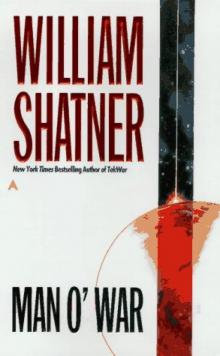 Man O' War
Man O' War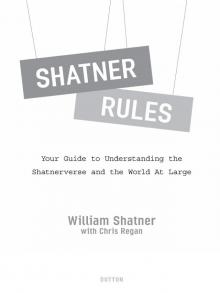 Shatner Rules
Shatner Rules Leonard
Leonard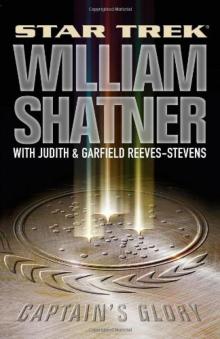 Captain's Glory
Captain's Glory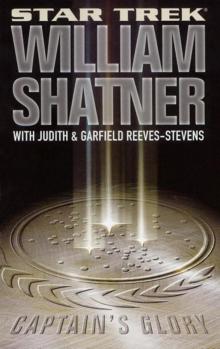 Captain's Glory зпвш-9
Captain's Glory зпвш-9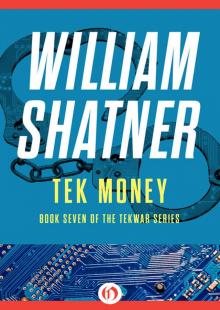 Tek Money
Tek Money Spirit of the Horse
Spirit of the Horse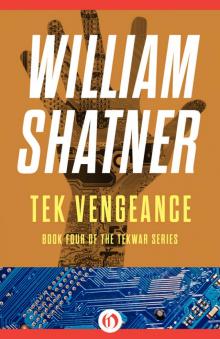 Tek Vengeance
Tek Vengeance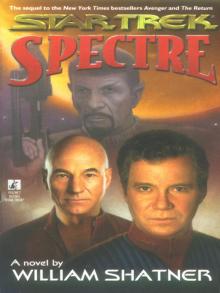 Spectre
Spectre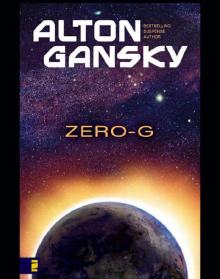 Zero-G
Zero-G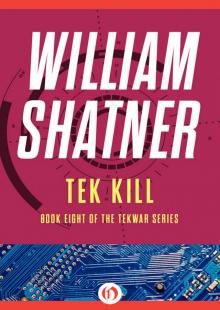 Tek Kill
Tek Kill Collision Course
Collision Course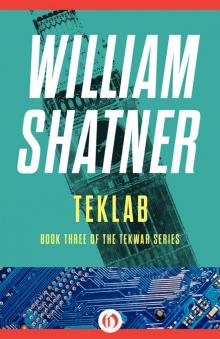 TekLab
TekLab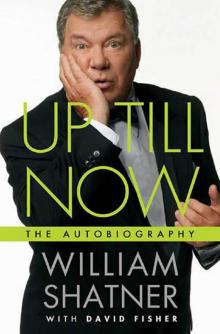 Up Till Now
Up Till Now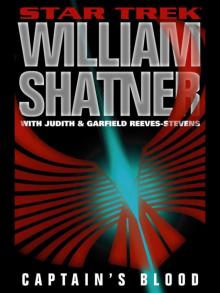 Captain's Blood
Captain's Blood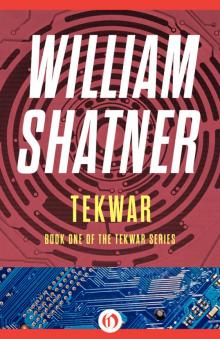 TekWar
TekWar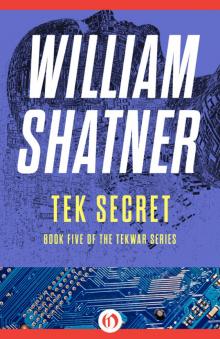 Tek Secret
Tek Secret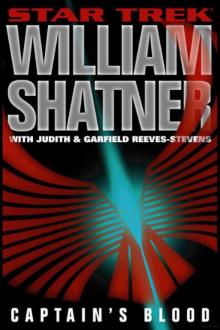 Captain's Blood зпвш-8
Captain's Blood зпвш-8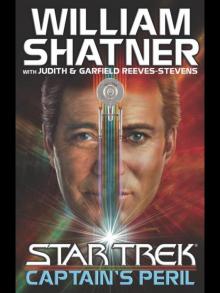 Captain's Peril
Captain's Peril Live Long and . . .
Live Long and . . .